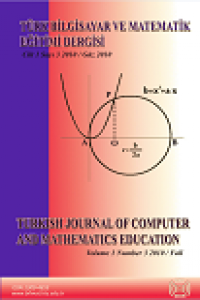Öz
Bu çalışmada lise öğrencilerinin matematiğe, bilgisayara, matematik dersinde bilgisayarın kullanımına yönelik tutumlarının belirlenmesi ve bunların bazı değişkenlere göre incelenmesi amaçlanmıştır. Bunun için Uşak il merkezinde bulunan 3 Anadolu Lisesi, 1 Anadolu Öğretmen Lisesi ve 1 Fen Lisesi öğrencilerinden 504 öğrenci örnekleme alınmıştır. Verilerin toplanmasında; Davranışsal Katılım (DaK), Bilgisayar kullanımıyla ilgili Güven (BG), Matematiksel güven (MG), Duygusal Katılım (DuK) ve Bilgisayar Destekli Matematik Öğretimine Yönelik Tutuma (BDMÖT) ilişkin 5 alt ölçekten oluşan Matematik ve Bilgisayar Tutum Ölçeği (MBTÖ) kullanılmıştır. Verilerin analizinde betimsel istatistik, bağımsız örneklemler için t-testi ve tek yönlü varyans analizi kullanılmıştır. Araştırma sonucunda, katılımcıların DaK, BG, MG ve DuK alt ölçeklerine ilişkin görüşlerinin olumlu olduğu ancak BDMÖT alt ölçeğine ilişkin görüşlerinin orta düzeyde olduğu görülmüştür. Ayrıca, DaK ve DuK alt ölçeklerinde kızlar lehine, BG alt ölçeğinde erkekler lehine istatistiksel farklılık olduğu belirlenmiştir. Bununla birlikte bilgisayara sahip olan öğrencilerin bilgisayar kullanımıyla ilgili güvenlerinin diğerlerine göre istatistiksel olarak olumlu yönde farklılık gösterdiği, bilgisayar deneyimi daha fazla olan öğrencilerin bilgisayar güvenlerinin diğerlerine göre daha yüksek olduğu ve bilgisayar destekli matematik öğretimine ilişkin tutumlarının da daha olumlu olduğu tespit edilmiştir.
Anahtar Kelimeler
Öz
Computer technology is integrated to modern society, including to education. In Turkey, computer use has become widespread in education in last decade. As a result of widespread integration of computer, the new mathematics curriculum (1-8th and 9-12th grades), which is prepared by the Ministry of National Education, [MNE] (2005a, 2005b, 2005c) in Turkey, emphasizes the importance of computer and technology, and teachers are expected to be more efficient in using computers in teaching and learning mathematics. For the last three decades, mathematics educators have focused on the effects of computers in students’ mathematics performance (Baki and Güveli, 2008; Isiksal and Askar, 2005; Kodippili and Senaratne, 2008; Lazakidou and Retalis, 2010; NCTM, 2000; Olkun, Altun, and Smith, 2005). For example, Baki and Güveli (2008) examined the effects of web-based mathematics teaching (WBMT) material on levels of achievement of 9th grade students in basic concepts of functions taking place in high school mathematics curriculum and attitudes towards WBMT. They found that WBMT has positive effects on student learning of mathematical function and on attitudes towards WBMT. Lazakidou and Retalis (2010) investigated the effectiveness of computer-based instructional method in Primary Education for self-regulated problem solving. Their results indicated that students could increase their problem-solving skills. Olkun, Altun and Smith (2005) explored the effects of computers on Turkish fourth-grade students’ geometry scores and further geometric learning and they found that students who did not have computers at home at the beginning had lower geometry scores.
Anahtar Kelimeler
Ayrıntılar
| Birincil Dil | Türkçe |
|---|---|
| Bölüm | Araştırma Makaleleri |
| Yazarlar | |
| Yayımlanma Tarihi | 6 Kasım 2013 |
| Yayımlandığı Sayı | Yıl 2010 Cilt: 1 Sayı: 3 |


